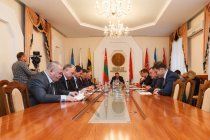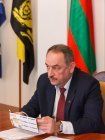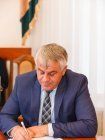 Русский
Русский English
English-







The Key to the Future
Regular meeting of the Presidium of the Supreme Council was traditionally held on Tuesday. The time of its beginning was non-traditional - 9:00, because a working meeting on the draft budget for next year was held by the President.
The budget topic, more precisely, the timing of the consideration of the main financial document of the year, was discussed during the meeting of the Supreme Working Body of the Supreme Council. The draft republican budget law for 2020 is under consideration by parliamentary committees. Almost every day the document receives amendments from the subjects of the law of legislative initiative. In the near future, it should be considered by deputies of the relevant parliamentary committee on economic policy, budget and finance. According to the decision of the members of the Presidium of the Supreme Council, the first reading of the draft budget 2020 should take place during the plenary meeting scheduled for December 4. In this regard, the Chairman of the parliamentary committee on social policy, Sergey Cheban, proposed to draw up a schedule for consideration of the main financial document of the country in the second and third reading for its timely further proofreading and forwarding to the President for signature.
Among the legislations, discussed by members of the presidium of the parliament were legislations that are supposed to be considered at the next plenary meetings. Among them there are two interconnected legislations that correct the current norms of the laws “On Excise Taxes” and “On Customs Tariff”. They are aimed at securing at the legislative level the authority of the Government to approve the procedure for providing benefits on the payment of excise taxes. Currently, these powers are voluntarily assumed by the customs service, although so, according to the deputy. Chairman of the State Customs Committee Alexei Lipovtsev, "it should not be." It is assumed that the document subsequently developed by the supreme executive authority will contain the procedure for classifying goods as excluded from the payment of excise taxes, the procedure for applying for benefits, a list of documents required for customs declaration of goods, the procedure for monitoring compliance with the conditions for granted benefits, the timing of goods under customs control, and also the procedure for removing goods from control by customs authorities.
Among the legislative novelties of these legislations is the consolidation of a new legal norm, which, among importers of excisable goods, will separately single out such a category as an “individual entrepreneur”. Along with this law-in-draft, it is proposed to authorize the government to determine the cases and conditions for the movement of goods for personal use across the customs border of the PMR, with the exemption of those who move them from paying excise taxes.
The Government has taken a legislative initiative to amend certain provisions of the current law “On the Procedure for Providing Financial, Tax and Statistical Reporting in Electronic Form via Telecommunication Channels”. It secures the right to provide these types of reports in electronic form through the state information system "Electronic Reporting". However, it was proposed to exclude the possibility of reporting electronically on electronic media such as flash drives and disks. This norm is dictated by the need to ensure information security in the executive bodies of state power, carrying out the reception of financial, tax and statistical reporting. Scanned documents are in the same row. They do not allow the processing of documents in the framework of the state information system "Electronic Reporting". The document provides for the possibility of round-the-clock reporting in electronic form.
A number of legislations initiated by the supreme executive authority suggest a reduction in the tax burden on such sectors of the republic’s economy as agricultural, road and municipal engineering, automotive, as well as housing and communal services. The goals of legislative innovations are to create favorable conditions for the development of entrepreneurship, attract investment in promising areas of production, stimulate business entities, including non-residents of Pridnestrovie, to open production facilities in Pridnestrovie that are currently absent, as well as to carry out capital repairs of the housing stock.






